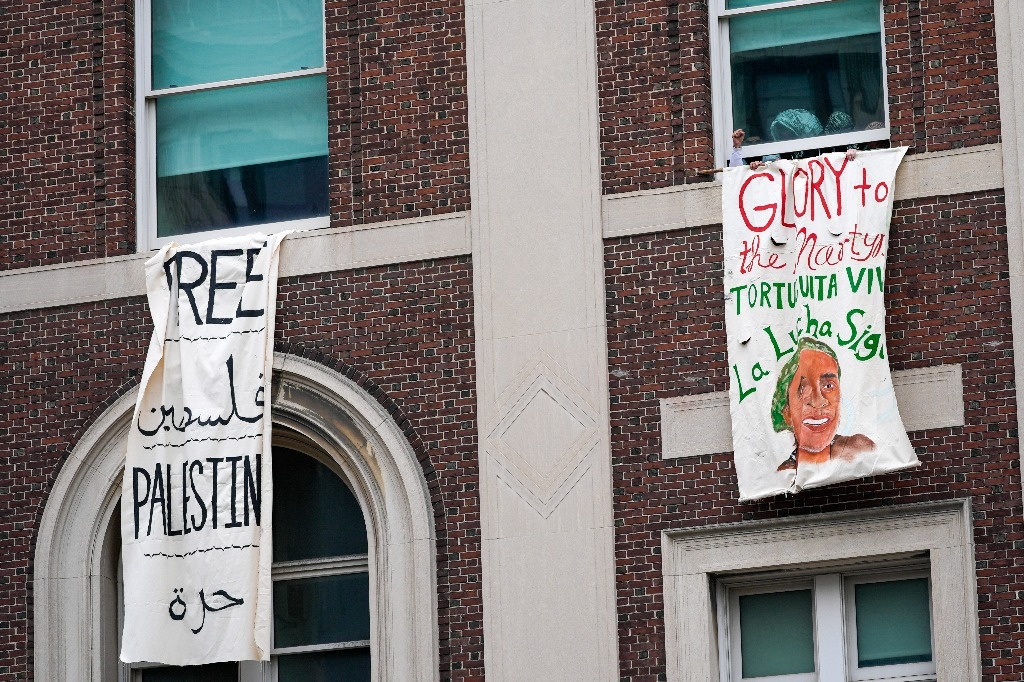NY. Protesters at Columbia University barricaded themselves inside a campus building early Tuesday, escalating a confrontation with campus authorities as pro-Palestinian protests continue at many other U.S. universities.
US President Joe Biden opposes the occupation of a building on the Columbia University campus by pro-Palestinian protesters, the White House said.
“The president believes that taking a campus building by force is absolutely the wrong approach,” National Security Council spokesman John Kirby said. “It is not an example of peaceful protest,” he added.
The occupation of Hamilton Hall at the prestigious New York University occurred hours after Columbia authorities said they had begun suspending students for not complying with an order to evacuate the camp they had set up on the grounds.
Young people with their faces covered broke windows and blocked the building’s entrances with metal desks, according to images shared overnight on social networks.
“After 206 days of genocide and more than 34,000 Palestinian martyrs, members of the Columbia community recaptured Hamilton Hall shortly after midnight,” the group said in a statement, alluding to Israel’s war in Gaza.
The group also said it had renamed the building “Hind’s Hall,” in honor of a six-year-old Gazan girl killed in the Israeli offensive against the Palestinian Islamist group Hamas.
The protesters said they will remain in the building until their demands are met, including that Columbia divest itself of all financial involvement linked to Israel.
The university rejected that demand. On Monday, Rector Minouche Shafik said talks with students “failed to reach an agreement,” according to a statement.
On Tuesday, as a crowd began to gather outside, a small police presence was established on the Columbia campus, an AFP journalist learned.
The takeover of the building was condemned by President Joe Biden, who in recent days asked to guarantee the freedom of expression of students and at the same time demanded that acts of anti-Semitism be avoided.
“The president believes that taking a campus building by force is absolutely the wrong approach,” National Security Council spokesman John Kirby said. “It is not an example of peaceful protest,” he added.
Coast to coast
Protests have spread to higher education institutions from coast to coast. Many have set up tent camps on campus lawns after about 100 protesters were first arrested in Columbia on April 18.
At the University of Texas at Austin, police clashed with protesters on Monday, including using pepper spray, and made arrests while dismantling an encampment, adding to more than 350 people detained nationwide over the weekend.
Paul Quinzi, of the Austin lawyers’ union that helps detainees, told AFP that they estimate “at least 80 arrests.”
Similar demonstrations have been replicated in France, at the Sorbonne University and at the Sciences Po institute.
The protests against the Gaza war, with their high number of Palestinian civilian casualties, have posed a challenge to university authorities to balance the right to freedom of expression with complaints that the rallies have descended into hatred and anti-Semitism.
Images of riot police inside universities to break up concentrations have gone around the world, recalling the protest movement that broke out in 1970 against the Vietnam War.
“Right of peaceful assembly”
U.N. human rights chief Volker Turk on Tuesday expressed concern about heavy-handed measures taken to disperse protests, saying that “freedom of expression and the right to peaceful assembly are fundamental to society.”
Turk added that “incitement to violence or hatred based on identity or points of view, whether real or perceived, must be strongly repudiated.”
Shafik, in his statement Monday, said: “Many of our Jewish students, and other students as well, have found the atmosphere intolerable in recent weeks. Many have left campus and that is a tragedy,” he said, adding that “the “Anti-Semitic language and acts are unacceptable.”
Protest organizers deny accusations of anti-Semitism, arguing instead that their actions are directed at the Israeli government and its handling of the conflict in Gaza.
The Gaza war began when Hamas militants carried out an unprecedented attack on Israel on October 7 that left around 1,170 dead, mostly civilians, according to an AFP tally of official Israeli figures.
Israel’s retaliation has killed at least 34,535 people in Gaza, mostly women and children, according to the Hamas-run territory’s Health Ministry.
#ProPalestinian #students #occupy #Columbia #University #building
– 2024-05-05 20:52:08
